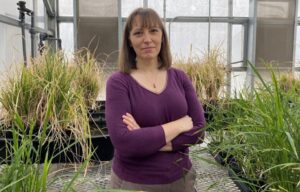
Photo credit: Rosemary Brandt, University of Arizona
Rebecca Mosher, UA Associate Professor in the School of Plant Sciences
Monday, September 26,
2:30-3:30 pm,
ASA Koffler Great Room
In 1990 the international Human Genome Project was launched to sequence the 30 billion DNA nucleic acid pairs that make up the human genome. A report for 85% of genome sequence was announced in 2003, with final gaps reported in January 2022. Advances in DNA sequencing, computation, and statistics have led to genome sequencing of many organisms, from viruses and bacteria to plants, fish, mice, and agricultural animals and plants. What have we learned about genomic makeup of humans and other species?
Dr. Rebecca Mosher will introduce us to this rapidly moving field. What percentage of DNA sequences are genes that code for the thousands of proteins that carry out critical cellular functions, and does that vary evolutionarily? In humans almost 99% of the genome is non-protein coding. What is the function of this DNA? How do mutation and other processes contribute to how genomes evolve in nature? In a biotechnology setting employing artificial selection, genetic modification or genome editing, what are the impacts and ethical implications?
Rebecca Mosher earned a BS from the University of Arizona, and a PhD from Duke University studying control of plant immunity. She then studied small RNAs as a Marshall-Sherfield and National Science Foundation International Research fellow with Sir David Baulcombe at The Sainsbury Laboratory and the University of Cambridge. In 2010 Dr. Mosher became Assistant Professor at the University of Arizona and advanced to Associate Professor in the School of Plant Sciences. Her lab combines classical genetics and modern genomics to study how small RNAs and DNA methylation silence genes and pass epigenetic information from one generation to the next. She serves on the editorial boards of The Plant Cell and Plant Direct, and is the recipient of The Bart Cardon Early Career Faculty Teaching Award and the University of Arizona Distinguish Scholar Award.
Written by Denice Smith, Academy Village Volunteer, and Rebecca Mosher
